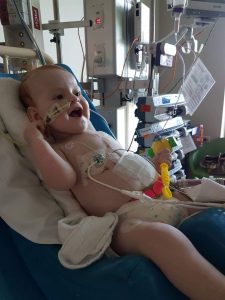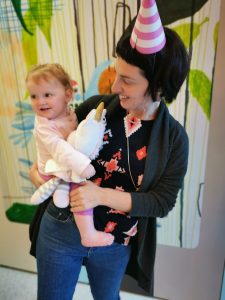When three year old Iris looks down at her chest and sees her scars, she doesn’t quite understand what they mean. However, for parents Kate and Sam, they are an everyday reminder of the incredible battle she has been through – and won.
One night, when Iris was seven months old, Kate and Sam noticed something wasn’t quite right with her. They rushed her to the RCH Emergency Department with what they thought was a bad case of gastro. Nurses tried to rehydrate her, but were unsuccessful. It was in this moment that Kate and Sam knew it was something more serious than gastro. What they didn’t know was that Iris was in acute heart failure.
When the clinician came to Iris’s bed, he took one look at her and immediately sent her to a resuscitation bay, an area of the Emergency Department reserved for seriously ill patients. Shortly after, Iris went into cardiac arrest. The teams worked quickly to resuscitate her little body and immediately after she was transferred to Rosella, the PICU.

Iris at the RCH after her VAD insertion surgery
“The staff were incredible. While we were terrified, we knew Iris was in the best hands. The staff weren’t 100 per cent sure what was going on, but they were pretty confident it was an issue with her heart,” said Sam.
After a sleepless night, the RCH Cardiology Team diagnosed Iris with dilated cardiomyopathy, which meant her heart muscles were stretched and unable to properly pump blood around her little body.
“They tried managing her condition with heart failure medication, but it didn’t work. Everything came to a head when they took her to surgery to put in a central line that would manage her medication and bloods. She didn’t really bounce back after that,” said Sam.
Kate and Sam had a conversation with Iris’s clinicians. Together they decided the only option was for her to go on a Berlin Heart Machine, a type of VAD that would take over the function of Iris’s heart and give it more time to heal and recover. If it didn’t recover on its own, the machine would allow her more time until she would need a transplant.
“Before the surgery to insert the VAD, Iris’s surgeon Professor Igor Konstantinov explained that they would need to take a small amount of heart tissue to insert a cannula into the ventricle. He asked if we would like to donate the tissue to the Melbourne Children’s Heart Tissue Bank,” said Sam.
The Melbourne Children’s Heart Tissue Bank, or biobank, is a component the CardioRegen project, a research program supported by the Shine On Foundation and the Loti and Victor Smorgon Family Foundation. The biobank collects heart tissue samples from patients who have come in for treatments for either congenital or acquired heart defects. The tissue samples collected by the biobank, including Iris’s, enable the Cardio Regen team to undertake a range of world leading research projects.
“It was never a question for us. We didn’t know if the VAD would help, or if Iris might need a transplant in the future, so having the knowledge that this small amount of tissue could potentially be used to help Iris or other children like her, gave us hope,” said Sam.
“It was comforting to know that there was research happening that would mean that if Iris needed a transplant or if she needed ongoing care and medication, that there may be a point where they would use the tissue to grow a small patch of cardiac tissue to help her function, or in the far future even grow her a new heart.”
Thankfully for Iris, after five months with the Berlin Heart Machine, her heart was strong enough that clinicians no longer needed to consider a transplant. Now more than two years on, her heart has fully recovered, and Iris is a happy and healthy little child, with no need for further treatments. Her last echocardiogram was entirely normal, and she is off all medications. The only reminder for her is the scars.

Iris and mum Kate celebrating Iris’s first birthday
“For Kate and me, it’s quite sobering knowing we’ve been a part of such a big picture project like this. When your baby is sick, you’re so focused on your own corner of the world. In that moment, it feels like you’re facing the worst day of your life on repeat. You become numb to everything else going on and just focus on what you need to do to get through the day,” said Sam.
“To be able to take that step back and see what the CardioRegen team were doing and how we were supporting that, it put a positive spin on the horrible experience we were going through. It was also an important part of the coping process for us, to know that no matter how things turn out for your child, that you’ve been a part of something so lifechanging.”
Sam and Kate know that without the support of organisations like the Shine On Foundation and the Loti and Victor Smorgon Family Foundation, there is no way that research like CardioRegen would be funded.
“Their contribution is so important, and we’re incredibly grateful that they have given the children like Iris better outcomes in the future,” said Sam.